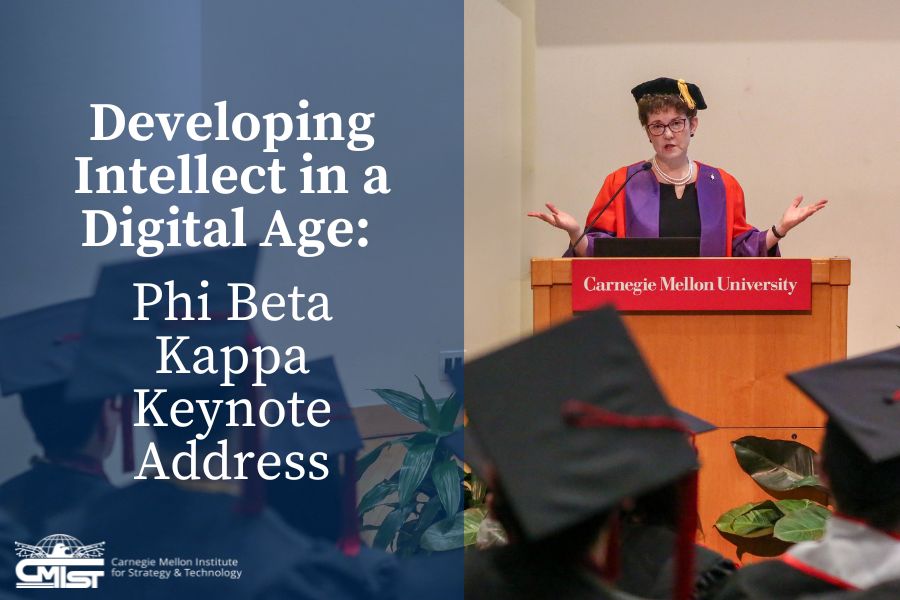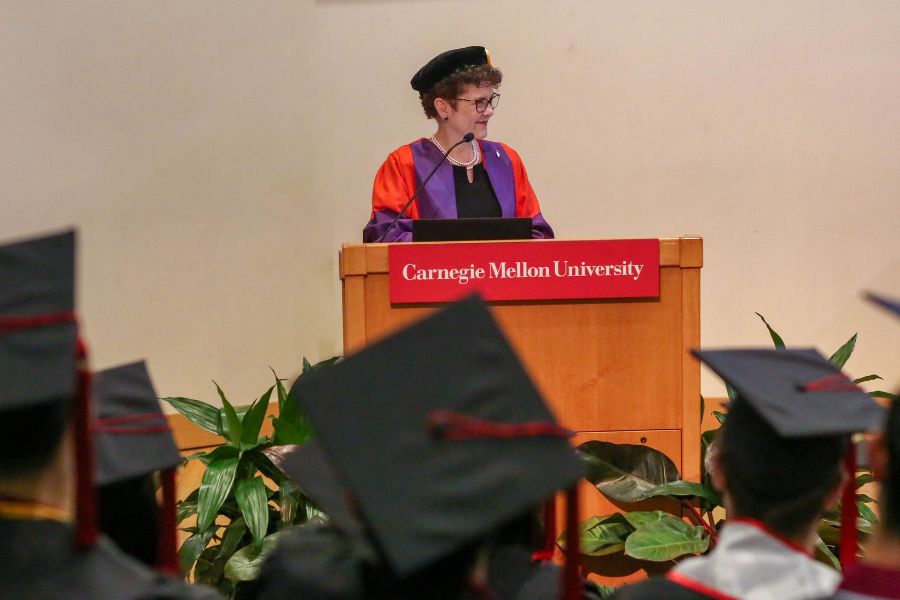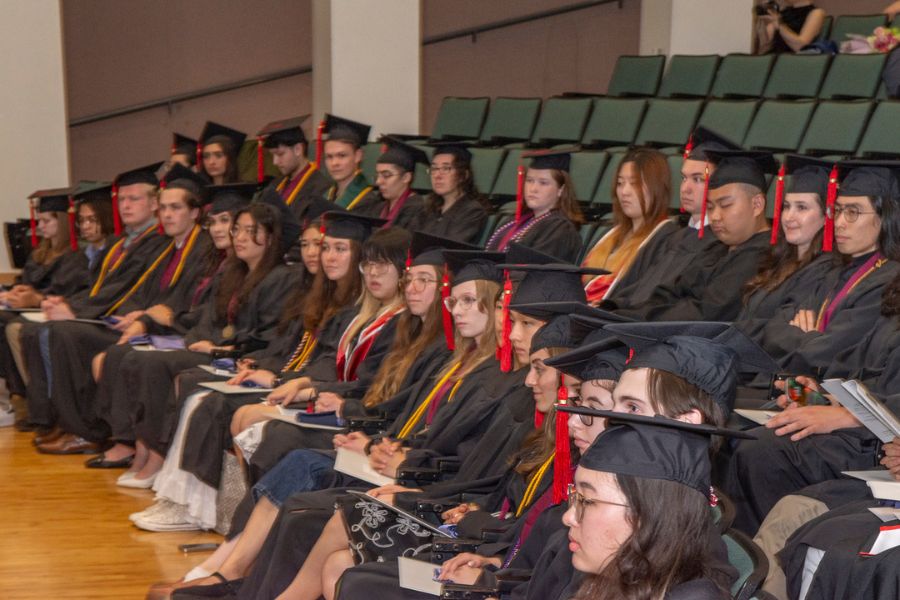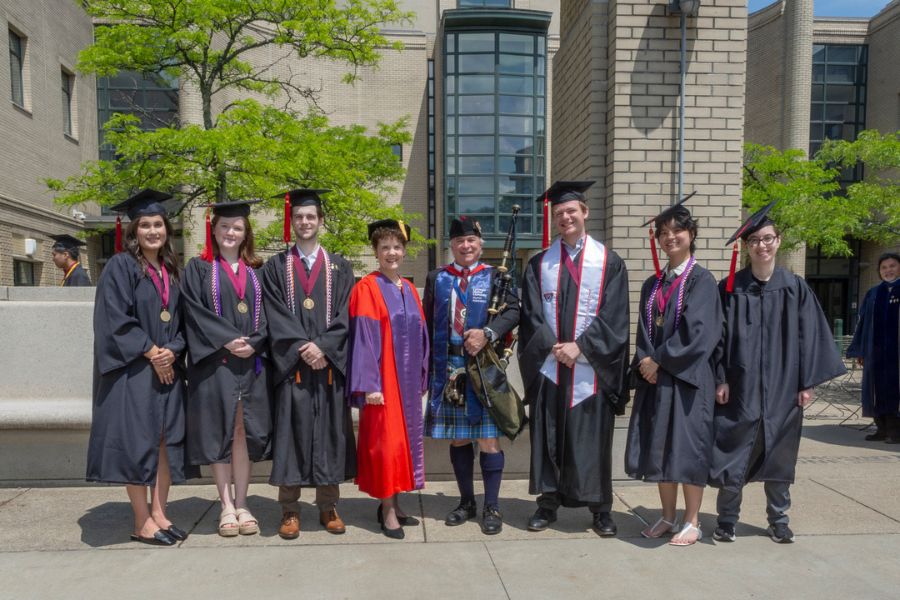
Developing Intellect in a Digital Age
Phi Beta Kappa Keynote Address
By Carolyn Just
Media Inquiries- Communications Specialist
On May 8, 2025, Professor Audrey Kurth Cronin, director of the Carnegie Mellon Institute for Strategy and Technology (CMIST), delivered a thought-provoking keynote address to Phi Beta Kappa inductees. Founded in 1776 at the College of William and Mary, Phi Beta Kappa is the oldest academic honor society in the United States. It recognizes outstanding academic achievement and commitment to the liberal arts and sciences, making membership a significant mark of scholarly distinction.
As a member of Phi Beta Kappa herself, inducted through the Princeton University chapter, Professor Cronin brought a deep personal connection to the occasion. Seven CMIST students were inducted into Phi Beta Kappa this year, a testament to their academic excellence.
Professor Cronin began by sharing a transformative moment from her own academic journey—an early tutorial at Oxford University, where a distinguished professor challenged her with a simple but profound question, “What have you read?” This encounter highlighted the importance of independent learning, a theme that resonated throughout her talk.

At the heart of her address, Professor Cronin explored the dynamic relationship between technological advancement and the core principles of the Enlightenment: transparency, intellectual endeavor, and the power of human reason. She acknowledged that while artificial intelligence offers extraordinary potential—from accelerating drug discovery to enabling more personalized forms of education—it also presents challenges. In particular, she cautioned that the opaque nature of many frontier AI models can put values like transparency and accountability at risk.
To illustrate the broader societal stakes, Professor Cronin pointed to a troubling statistic: “More than half of American adults read below the sixth-grade level.” This decline, she suggested, is part of a broader cultural shift away from sustained mental effort. Such disengagement, she asserted, weakens not only individual intellectual growth but also the foundation of democratic life.

The influence of AI on intellectual development was a key focus of her address. Professor Cronin highlighted a study in which AI-enhanced tools helped law students produce work that outperformed their peers in clarity, organization, and professionalism. Yet, she raised concerns about whether such tools, although beneficial, might undermine the cultivation of critical thinking skills. “Will tomorrow’s creative legal minds still develop the intellectual depth needed to become the next great legal thinkers?” she asked.
Drawing on her Oxford experience, Professor Cronin emphasized the importance of personal responsibility in education. She noted that true intellectual growth requires struggle and perseverance, qualities that AI-driven shortcuts cannot replace. “You are responsible for the development of your own intellect,” she declared, urging students to engage deeply with their studies, rather than opting for convenience.
Reminding students that true wisdom cannot be replaced by algorithms or summarized in brief, automated responses, Professor Cronin concluded her speech with a call to embrace reflective thinking and lifelong learning. “Human judgment, creativity, and insight arise from grappling with complexity and developing a personal understanding of the world,” she said. Her final message to the students was this: Real human progress is born from intellectual struggle, not ease.

At a time when generative AI and machine learning are reshaping how we interact with information, Professor Cronin’s message pushed back against the growing temptation of passive, surface-level engagement. She urged the future leaders in the audience to use technology wisely—as a tool that complements, not replaces, deep thought. She encouraged them to read deeply, think critically, and question boldly, not just as academic habits, but as vital practices of informed citizenship.
Her reflections underscored a question that is more relevant than ever: In a world saturated with information, what does it mean to truly know something? For Professor Cronin, knowledge is not just the accumulation of facts but the disciplined pursuit of truth, the courage to confront complexity, and the judgment to act wisely. This perspective struck a chord with the Phi Beta Kappa inductees, who are starting their own journeys as scholars and leaders.
In an era when policy decisions are increasingly driven by data and algorithms, Professor Cronin’s emphasis on critical thinking, independent learning, and intellectual courage serves as a reminder that effective policy is not just about information—it’s also about how we use it. As CMIST students and scholars continue their work at the forefront of technology, policy, and security, her words stand as a call to approach complex challenges with both real knowledge and integrity.

(Image 1: Professor Audrey Kurth Cronin, CMIST Director, gives the keynote address; Image 2: Phi Beta Kappa inductees spring 2025; Image 3: In her remarks, Professor Cronin called inductees to embrace reflective thinking and lifelong learning; Image 4: Congratulations to our CMIST students initiated into Phi Beta Kappa Spring 2025, including Riley Green, Colleen Moosman, Creighton Arrington, Kyle Hynes, Lucia Shen, Cody Berger, Joyce Lee. Students pictured here with Professor Audrey Kurth Cronin, Joyce Lee in absentia)
